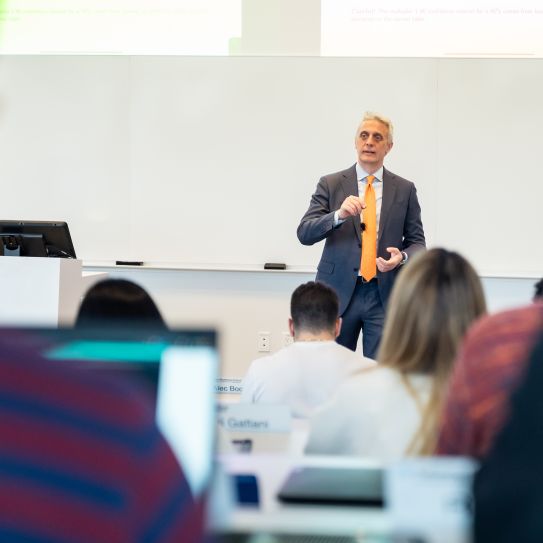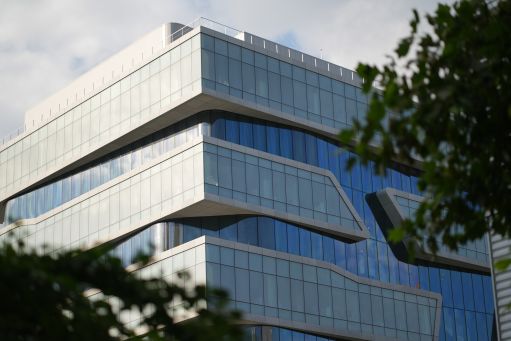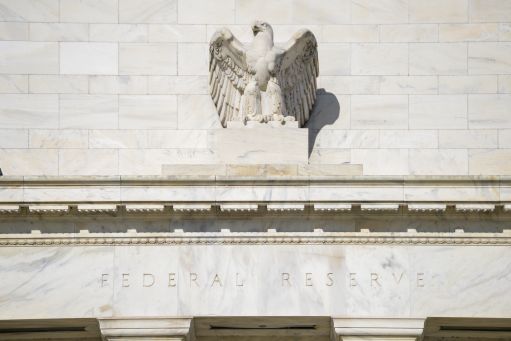Understanding the Impact of Breakthrough Technologies
Dean Costis Maglaras discusses his new class, shares thoughts on returning to the classroom after three years.

This fall, Columbia Business School Dean Costis Maglaras returned to the classroom to teach a new class alongside Professor Shih-Fu Chang, dean of Columbia Engineering.
Technology Breakthroughs examines the impact that new technologies have had on business and society, from AI and robotics to blockchain and digital cities.
We recently spoke with Dean Maglaras about returning to the classroom and the importance of teaching his new class now.
Q: You’re back in the classroom after three years. What made you decide to return?
Dean Maglaras: Technology, software, data, and algorithms have changed our lives and the world of business in so many ways. I feel it’s crucial for students to understand these changes.
And, of course, there’s something exciting about being in the classroom again and connecting with students — I really like that.
Q: Tell us about the class.
Dean Maglaras: We aim to give an overview of some of the breakthroughs that are driving change at present, and those that are poised to continue to do so over the next 5 to 10 years.
For each session we bring in faculty experts, founders, scientists, CTOs, and investors to provide technology overviews, discuss how these are implemented in practice today, and talk about the future.
We look at six areas: deep learning and neural networks; AI and robotics; imaging and vision; photonics; blockchain; and smart / digital cities.
In each area we will get an overview of the technology and seek to understand the problems being addressed, and the important open questions to be addressed in the future. We also review successful applications and try to glean insight as to areas where successful implementation is still more elusive.
Lastly, we discuss the investment and entrepreneurial landscape in each area.
Q: Why do you think teaching this class is so important now?
Dean Maglaras: Technological breakthroughs have relentlessly driven change and disruption, and that has affected every aspect of our lives. Those breakthroughs have transformed traditional industries and created new ones for digital goods and services. And they are changing every possible career path that students embark on after their degrees.
Q: What are you most excited about in this class?
Dean Maglaras: Generally I’m excited about all these trends in technology because they’re so critically important to understand.
If you look at our class schedule, you’ll see that we are incorporating input from top experts in our fields of study, such as:
- The history and recent rise to prominence of deep learning and neural networks with guest lecturers Professor Daniel Guetta and Professor Garud Iyengar.
- The new technologies that enable machines to capture and analyze visual data with Professor Shree Nayer and Professor Carl Vondrick.
- The robotics and AI revolution with Professor Hod Lipson.
- The rapidly evolving field of silicon photonics with Professor Michal Lipson.
- Professors Ciamac Moallemi and Tim Roughgarden on the latest developments in blockchain.
- And smart cities initiatives with Professor Andrew Smyth.
More Features

Value Investing: How CBS is Staying Ahead of the Curve
Learn how Columbia Business School is updating its acclaimed value investing curriculum to align with a rapidly changing financial landscape.

The Fed and Interest Rates: Is Flexibility the Best Approach?
Professor Pierre Yared talks about his recent research, which looks at the rising popularity of guiding monetary policy through target-based rules.

Interest Rates and Inflation: What’s Next for the Federal Reserve?
Professor Pierre Yared describes why the U.S. economy is unlikely to see an economic downturn comparable with the 1970s.

Is the U.S. in Recession? CBS Experts Weigh in on the Economic Outlook
New data has sparked a debate about the state of the economy. Here’s what some of our faculty members had to say.
Rise to the challenge.
The COVID-19 pandemic has changed the world of business, while bringing historical inequities and injustice into sharp relief.
Subscribe to Leading Through Change to receive the latest insights from Columbia Business School to help you navigate this unprecedented time.
